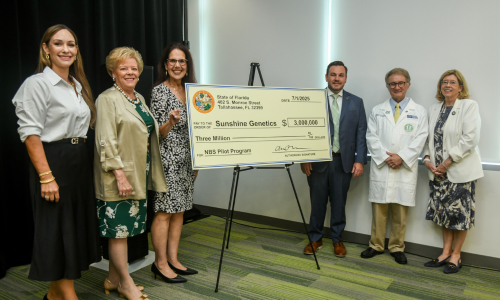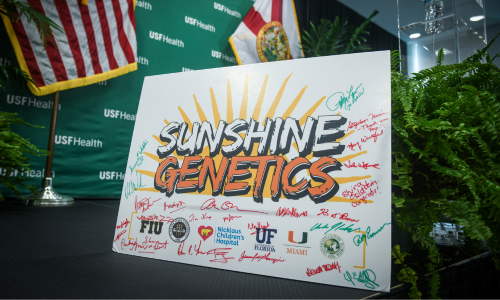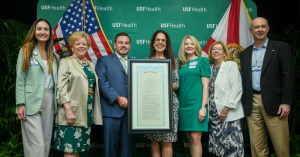The University of South Florida is leveraging its position as Florida’s leader in
genetic counseling and precision medicine to help launch a statewide program that
will give families the option to have their newborn’s entire genetic code sequenced
at birth.
The five-year newborn screening pilot program, created by the Sunshine Genetics Act (HB 907) and championed by Rep. Adam Anderson, aims to identify potentially serious, but treatable
conditions early, allowing doctors to begin care before symptoms appear.
The act also established the Sunshine Genetics Consortium, a network of top clinical
and academic leaders from Florida’s universities and children’s hospitals, to administer
the pilot program and advance cutting-edge research in genomic medicine. USF’s partnership
with the consortium was celebrated at the USF Health Downtown facility today, where
state and university leaders highlighted the initiative’s future impact for Florida
families.
“USF’s trailblazing genomic research, amplified by the Sunshine Genetics Act, will
revolutionize health care and give Florida’s children a brighter, healthier tomorrow,”
Anderson said. “Their vital work in early detection and innovative care is transforming
lives, and I’m excited to see the program’s growth as USF continues to lead the charge
for healthier futures.”
In the U.S., an estimated 10,000 rare diseases affect 30 million Americans, with 80%
of these conditions being genetic. For many, genetic testing is the only way to make
a definitive diagnosis. Early intervention can improve health, reduce hospital visits
and enhance quality of life.
As part of the Sunshine Genetics Consortium, USF will leverage its expertise in genomics
to advance the early detection of rare diseases in newborns. At Tampa General Hospital, USF Health researchers and clinicians will offer genetic screening and genome sequencing
at no cost to families, made possible through state funding that supports the program.
Tampa General is an ideal clinical setting for the pilot program, delivering more
than 7,000 babies each year and managing the state’s highest-risk cases. Its Department
of Obstetrics & Gynecology, led by USF Health faculty, was recently ranked No. 5 in the nation and No. 1 in Florida by U.S. News & World Report.
Joining USF as partners in the consortium are Nicklaus Children’s Hospital, Florida
International University, Florida State University, the University of Miami and the
University of Florida. Together, the network aims to expand collaborative pediatric
rare disease research across the state and accelerate the growth of Florida’s genomic
medicine industry.
“The Sunshine Genetics Act that Rep. Anderson championed offers opportunities to decode
the mysteries of rare genetic disorders, bringing hope — rather than despair — to
thousands of families in Florida and beyond,” USF President Rhea Law said. “The University
of South Florida is dedicated to improving lives and creating a healthier future for
all, and we look forward to contributing to this critically important initiative.”


This initiative builds upon USF’s long history as the state’s leader in genetic counseling
and genomic medicine. USF Health established the Regional Genetics and Metabolism Program in 1977 to provide comprehensive evaluation and care for children and adolescents
with genetic conditions, and the USF College of Public Health is home to Florida’s only accredited Genetic Counseling Graduate Program. Its graduates represent approximately 20% of all practicing genetic counselors in
the state.
USF researchers are also leading one of the few NIH-funded studies evaluating genetic
counseling outcomes, while scientists at the Morsani College of Medicine — Florida’s top-ranked and only Tier 1 medical school for research according to U.S. News & World Report — are pioneering discoveries in
the fields of gene therapy, genetic mapping and cardio genetics.
“Thanks to the Sunshine Genetics Act, Florida will be at the forefront of research
and development of new tools to save babies’ lives and improve their health,” said
Dr. Charles J. Lockwood, executive vice president of USF Health and dean of the USF
Health Morsani College of Medicine. “USF Health is honored to participate in the Sunshine
Genetics Consortium, and we look forward to lending our considerable resources — from
genetic counseling and education programs to our extensive research infrastructure
— to collaborative efforts that will advance the science in an arena so important
to the future of Florida.”
